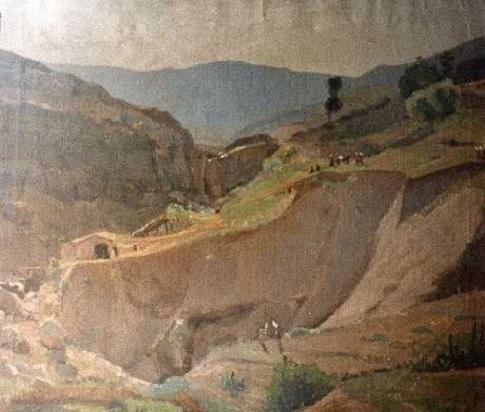* * *
 "Kodrat në Dishnicë", Vangjush Mio
"Kodrat në Dishnicë", Vangjush Mio
Lovers are close to it, in wonder, if the other were not always there closing off the view.....
Rainer Maria Rilke
The Eighth Elegy
The creature gazes into openness with all
its eyes. But our eyes are
as if they were reversed, and surround it,
everywhere, like barriers against its free passage.
We know what is outside us from the animal’s
face alone: since we already turn
the young child round and make it look
backwards at what is settled, not that openness
that is so deep in the animal’s vision. Free from death.
We alone see that: the free creature
has its progress always behind it,
and God before it, and when it moves, it moves
in eternity, as streams do.
We never have pure space in front of us,
not for a single day, such as flowers open
endlessly into. Always there is world,
and never the Nowhere without the Not: the pure,
unwatched-over, that one breathes and
endlessly knows, without craving. As a child
loses itself sometimes, one with the stillness, and
is jolted back. Or someone dies and is it.
Since near to death one no longer sees death,
and stares ahead, perhaps with the large gaze of the creature.
Lovers are close to it, in wonder, if
the other were not always there closing off the view.....
As if through an oversight it opens out
behind the other......But there is no
way past it, and it turns to world again.
Always turned towards creation, we see
only a mirroring of freedom
dimmed by us. Or that an animal
mutely, calmly is looking through and through us.
This is what fate means: to be opposite,
and to be that and nothing else, opposite, forever.
If there was consciousness like ours
in the sure creature, that moves towards us
on a different track – it would drag us
round in its wake. But its own being
is boundless, unfathomable, and without a view
of its condition, pure as its outward gaze.
And where we see future it sees everything,
and itself in everything, and is healed for ever.
And yet in the warm waking creature
is the care and burden of a great sadness.
Since it too always has within it what often
overwhelms us – a memory,
as if what one is pursuing now was once
nearer, truer, and joined to us
with infinite tenderness. Here all is distance,
there it was breath. Compared to that first home
the second one seems ambiguous and uncertain.
O bliss of little creatures
that stay in the womb that carried them forever:
O joy of the midge that can still leap within,
even when it is wed: since womb is all.
And see the half-assurance of the bird,
almost aware of both from its inception,
as if it were the soul of an Etruscan,
born of a dead man in a space
with his reclining figure as the lid.
And how dismayed anything is that has to fly,
and leave the womb. As if it were
terrified of itself, zig-zagging through the air, as a crack
runs through a cup. As the track
of a bat rends the porcelain of evening.
And we: onlookers, always, everywhere,
always looking into, never out of, everything.
It fills us. We arrange it. It collapses.
We arrange it again, and collapse ourselves.
Who has turned us round like this, so that,
whatever we do, we always have the aspect
of one who leaves? Just as they
will turn, stop, linger, for one last time,
on the last hill, that shows them all their valley - ,
so we live, and are always taking leave.
Translated by A. S. Kline © 2001 All Rights Reserved




 del.icio.us
del.icio.us Digg
Digg

Post your comment